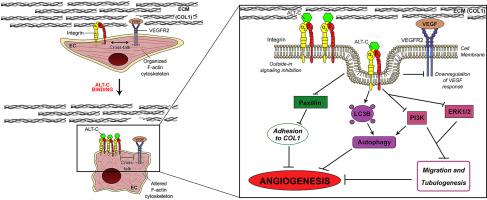Our official English website, www.x-mol.net, welcomes your feedback! (Note: you will need to create a separate account there.)
Alternagin-C (ALT-C), a disintegrin-like protein, attenuates alpha2beta1 integrin and VEGF receptor 2 signaling resulting in angiogenesis inhibition.
Biochimie ( IF 3.9 ) Pub Date : 2020-04-30 , DOI: 10.1016/j.biochi.2020.04.023 Patty K Dos Santos 1 , Wanessa F Altei 1 , Taís M Danilucci 1 , Rafael L B Lino 1 , Bianca C Pachane 1 , Ana C C Nunes 1 , Heloisa S Selistre-de-Araujo 1
Biochimie ( IF 3.9 ) Pub Date : 2020-04-30 , DOI: 10.1016/j.biochi.2020.04.023 Patty K Dos Santos 1 , Wanessa F Altei 1 , Taís M Danilucci 1 , Rafael L B Lino 1 , Bianca C Pachane 1 , Ana C C Nunes 1 , Heloisa S Selistre-de-Araujo 1
Affiliation

|
Angiogenesis, a crucial process in tumor progression, is mainly regulated by vascular endothelial growth factor (VEGF) and its receptor, VEGFR2. Studies have shown the interaction between α2β1 integrin, a collagen receptor, and VEGFR2 in VEGF-driven angiogenesis in vitro and in vivo. Alternagin-C (ALT-C), an ECD-disintegrin-like protein from Bothrops alternatus snake venom, has high affinity for α2β1 integrin and shows antiangiogenic activity in concentrations higher than 100 nM. Despite previous results, its mechanism of action on angiogenic signaling pathways has not been addressed. Here we evaluate the antiangiogenic activity of ALT-C in human umbilical vein endothelial cells (HUVECs) associated or not with VEGF, as well as its interference in the α2β1/VEGFR2 crosstalk. ALT-C (1000 nM) affected actin cytoskeleton, decreased the number of cell filopodia, and strongly inhibited HUVEC tube formation, adhesion to type I collagen and cell migration. Down-regulation of α2β1/VEGFR2 crosstalk by ALT-C decreased the protein content and phosphorylation of VEGFR2 and β1 integrin subunit, inhibited ERK 1/2 and PI3K signaling and regulated FAK/Src and paxillin pathways. Furthermore, ALT-C increased the content of the autophagic markers LC3B and Beclin-1 in the presence of VEGF, which is associated with decreased angiogenesis. In conclusion, we suggest that ALT-C, after binding to α2β1 integrin, inhibits VEGF/VEGFR2 signaling, which results in impaired angiogenesis. These results demonstrate that ALT-C may be a potential candidate for the development of antiangiogenic therapies for tumor and metastasis treatment and help to understand the complexity and fundamental role of integrin inhibition in the tumor microenvironment.
中文翻译:

Alternagin-C(ALT-C)是一种整合素样蛋白,可减弱alpha2beta1整合素和VEGF受体2信号传导,从而抑制血管生成。
血管生成是肿瘤进展中的关键过程,主要受血管内皮生长因子(VEGF)及其受体VEGFR2调控。研究表明,在体内外,VEGF驱动的血管生成中α2β1整合素,胶原蛋白受体和VEGFR2之间的相互作用。Alternagin-C(ALT-C)是一种来自Bothrops alternatus蛇毒的ECD-disintegrin样蛋白,对α2β1整联蛋白具有高度亲和力,并且在浓度高于100 nM时显示出抗血管生成活性。尽管有先前的结果,但尚未探讨其对血管生成信号通路的作用机理。在这里,我们评估了ALT-C在与VEGF相关或不相关的人脐静脉内皮细胞(HUVEC)中的抗血管生成活性,以及其对α2β1/ VEGFR2串扰的干扰。ALT-C(1000 nM)影响肌动蛋白细胞骨架,减少了细胞丝状伪足的数量,并强烈抑制了HUVEC管的形成,对I型胶原的粘附和细胞迁移。ALT-C下调α2β1/ VEGFR2串扰可降低VEGFR2和β1整联蛋白亚基的蛋白质含量和磷酸化,抑制ERK 1/2和PI3K信号传导,并调节FAK / Src和paxillin途径。此外,在VEGF存在下,ALT-C增加了自噬标记物LC3B和Beclin-1的含量,这与血管生成减少有关。总之,我们认为,ALT-C与α2β1整联蛋白结合后会抑制VEGF / VEGFR2信号传导,从而导致血管生成受损。
更新日期:2020-04-30
中文翻译:

Alternagin-C(ALT-C)是一种整合素样蛋白,可减弱alpha2beta1整合素和VEGF受体2信号传导,从而抑制血管生成。
血管生成是肿瘤进展中的关键过程,主要受血管内皮生长因子(VEGF)及其受体VEGFR2调控。研究表明,在体内外,VEGF驱动的血管生成中α2β1整合素,胶原蛋白受体和VEGFR2之间的相互作用。Alternagin-C(ALT-C)是一种来自Bothrops alternatus蛇毒的ECD-disintegrin样蛋白,对α2β1整联蛋白具有高度亲和力,并且在浓度高于100 nM时显示出抗血管生成活性。尽管有先前的结果,但尚未探讨其对血管生成信号通路的作用机理。在这里,我们评估了ALT-C在与VEGF相关或不相关的人脐静脉内皮细胞(HUVEC)中的抗血管生成活性,以及其对α2β1/ VEGFR2串扰的干扰。ALT-C(1000 nM)影响肌动蛋白细胞骨架,减少了细胞丝状伪足的数量,并强烈抑制了HUVEC管的形成,对I型胶原的粘附和细胞迁移。ALT-C下调α2β1/ VEGFR2串扰可降低VEGFR2和β1整联蛋白亚基的蛋白质含量和磷酸化,抑制ERK 1/2和PI3K信号传导,并调节FAK / Src和paxillin途径。此外,在VEGF存在下,ALT-C增加了自噬标记物LC3B和Beclin-1的含量,这与血管生成减少有关。总之,我们认为,ALT-C与α2β1整联蛋白结合后会抑制VEGF / VEGFR2信号传导,从而导致血管生成受损。


























 京公网安备 11010802027423号
京公网安备 11010802027423号